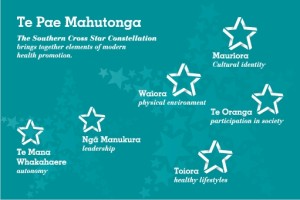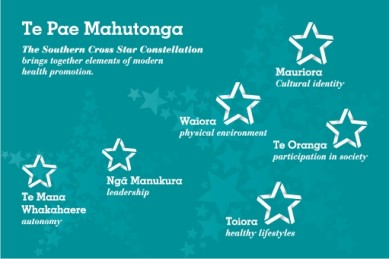
Te Pae Māhutonga a valuable compass for health and wellbeing
HPF held its first online workshop (webishop) of the year on Mar 20 with the focus of discussion on the Māori health promotion model, Te Pae Māhutonga and how it can be applied in today’s challenging environment.
The HPF team catch up with guest speakers Grant Berghan and Fran Kewene (right) before the webishop
The webishop was engaging and interactive, with participants asking our speakers some thought-provoking questions.
The first of our guest speakers, Fran Kewene, a Hauora Māori lecturer at Te Herenga Waka Victoria University, discussed the importance of advocating for Māori health and disability rights and highlighted the establishment of Waikaha, the Ministry of Disabled People, as a significant milestone.
Fran emphasized the need for culturally responsive support systems for Māori with disabilities, particularly those with autism, and stressed the importance of including Tangata Māori in decision-making processes.
Fran also shared her personal experience as a mother of an autistic son and her involvement in various initiatives to improve support for disabled Māori in the community.
Our next speaker Grant Bergen, a respected leader in public health and Māori health advocacy, acknowledged the challenges being faced in the public health sector, and other sectors, which was impacting the ‘morale, wellbeing and motivation’ of many.
 Grant looked at how Te Pae Māhutonga could be used as a personal and professional compass, to navigate adversity and build resilience, and as a framework for personal wellbeing and leadership.
Grant looked at how Te Pae Māhutonga could be used as a personal and professional compass, to navigate adversity and build resilience, and as a framework for personal wellbeing and leadership.
He discussed the importance of self-reflection, leadership, and stress management, and encouraged us to focus on our own autonomy and wellbeing, and to find balance and harmony in our lives. He highlighted the significance of social participation and sense of belonging in maintaining good health.
Grant also shared his experience using Te Pae Māhutonga for strategic planning in a district health board, emphasizing flexibility and community engagement.
HPF’s Executive Director, Sione Tu’itahi highlighed the widespread adoption of Te Pae Māhutonga in research, health promotion programmes, and even internationally, noting its increased relevance today due to its comprehensive approach to wellbeing.
Fran agreed, adding that it was also used widely used in university education for training health promoters.
All the speakers agreed on the framework's value while acknowledging the importance of remaining open to adaptations and new models to address any gaps.